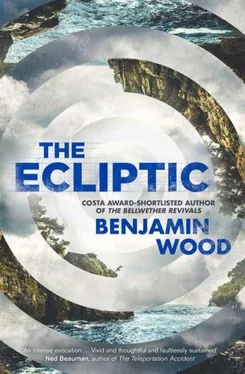‘Please, just put me through to Victor. It’s about his son. I called yester—’
‘ Hello? Are you still there? ’
Three more blips and it cut off. I smashed down the receiver and the mouthpiece broke.
I was too cold, too tired, in too much pain. I had to get some shelter.
There was a faded sign upon the fence: HEYBELIADA PLAJI. The gate had no padlock; I slid out the bolt. The hinges wailed as I went in. But the main building was shut, the doors chained up. Metal shutters at the windows. It was all that I could do to crawl into the stacks of chairs and loungers. I knocked a column of them and they landed in the parasols, which toppled to the ground before me. I thought their canopies looked warm and shielding. Hobbling on my knees, I went to nestle under them. I lay beneath their musty awnings and their ribs and springs and poles. The stars were jewels in the small gaps above me, and I was nothing any more, and nobody.

Daylight tinted blue by parasols. The cosy dampness of a tent. I woke up feeling more exhausted than before I had passed out. Ceaseless pain around my collarbone, zipping through my legs. I rested on the concrete, eyes shut, counting down the seconds. Things almost went to black. I nearly let it happen. But then I heard the clopping of a horse near by and the jangle of its tack. Fear kept me awake. There was a noise of cart wheels on the road and a far-off voice called softly: ‘ Woe, woe, ayy. ’ And suddenly, another voice, much closer, right beside my head. I winced, holding my breath. His feet scratched the ground — so near to me. He carried on in Turkish: a dead-end conversation. I thought I could smell smoke again, but no. His feet scuttled up close to me and there were movements from above. Rustling and murmurs. The parasols were being lifted from me, one by one. There was nothing I could do. I lay there, waiting like a louse under a rock. The daylight greyed. I was exposed. He spread his shadow over me. His hands stayed on his hips. A cigarette fuming at his mouth. I got to my knees, squinting back at him. And I could see he wore a pale blue shirt with an embroidered crest: POLIS. He said something meaningless. He repeated it louder, flapping his arms. I took too long to react: he stepped to me, grabbing my hand, pulling me up by my elbow. He might as well have shot me. I screamed so loud the crows dashed from the palm trees. Everything went white.
Then I was looking at the glossy backside of a horse. A man in a black cap was at the reins, facing the road. I was propped up in an open fayton with the POLIS man beside me. The horse was hoofing slowly down the track. We were curving back around the bay, the sea to our left, the scrabbly beach made clearer by the light of morning. A sloop was moored out in the shallows, tilting on the waves. ‘Adiniz ne?’ said the POLIS man. I looked at him, afraid. He offered me a cigarette. I shook my head. ‘ Anliyor musunuz? ’ His arms were sprawled along the back seat of the carriage. The horse clopped on. I did not speak. I gazed towards the sea. I watched the listing of the sloop at anchor. Upturned dinghies by the jetty. A bluff of trees across the bay. And then I caught a glimpse of something in the jumble of the beach: a long black shape upon the gravel. My canvas roll, still in its plastic. The sea had brought it to me.
I stood up in the fayton. The wheels were rolling quickly, but I jumped. ‘ Hayir! Hayir! ’ called the POLIS man. The pain of the landing tore me in half. I fell upon the road and hit my head. The last thing I heard was the fayton skidding to a stop. All the dismal voices I had pushed back in my mind escaped me then, as I lay bleeding. They said that I should stay down in the dirt where I belonged.

A familiar kind of ceiling, low and speckled. I found myself in a magnolia room with the pain muted out, fluids going into me through a tube. Right arm in a sling and thirsting. In the corner stood a dark-haired man in uniform, pure white and steam-pressed. He had three gold pips on his epaulettes and a face of consternation. ‘Do you know where you are?’ he said, watching me stir. I shook my head.
I was not in a bed but on a padded trolley. They had dressed me up in pale blue fatigues. ‘This is the Naval Academy, the hospital bay,’ he said. ‘You were brought by the police.’ I tried to clear my throat but nothing would come out. ‘Would you like some water?’ He filled a paper cup from a cooler by the wall and handed it to me. ‘Your clavicle is broken. It will get better in a month or maybe two. There are some stitches in your head, but the scar I think will be OK. I can say that you are very lucky.’ The water was so cold I could not taste it. ‘More?’ he said.
I gulped and hummed.
There was a youthful slouch about his step as he went to the cooler. But he was much too old to be a cadet. He must have been an officer. Passing me the cup again, he smiled. ‘What is your name?’
I croaked it out: ‘Elspeth.’
‘Ah. You can speak,’ he said with a grin. He had teeth as bright and straight as his trouser seams. ‘ Elspess. That is good. I like this name.’
I blinked at him.
He went to get a cardboard folder from a stand on the wall. Through the wire-glass in the door, I could see into the hallway. Framed photographs of sea cadets in dress regalia were hung from floor to ceiling. ‘The police bring you here and tell me: she does not have any identifications. She has no name. They think you have no business here and so you do not deserve help from anyone, but they do not want your blood to spill on their nice shoes, so they get me to look at you. There are some people in this life who do not have God’s kindness in them. Do you know what I am saying to you?’
I blinked at him.
He flipped through the folder, reviewing his notes. ‘But now you have a name. Elspess . So, you see — you are a person now, like me and them. You are the same as everyone else.’ He removed a clear plastic wallet from the folder. My ferry tokens weighted down the bottom corner. There was sheet of creased-up paper in there, too. He held it out for me to scrutinise. ‘I did not show this to them,’ he said, ‘but maybe I will have to, for my own sake.’
It was MacKinney’s letter. Badly water-damaged. There was none of her usual cursive. Just the remnants of typewritten words, blotted out and paling:

It winded me. ‘Where did you get this?’
‘From your clothes. You are lucky that I found it before the police.’
I went quiet. I could not understand why Mac would give it to me. She must have handed me the wrong letter.
‘You know, I have treated some people like you here before,’ the doctor went on. ‘Coming down from that big house when they get sick. I cannot say that I am happy about this arrangement, and I do not like those people up there very much, or their policeman friends. But I am a doctor — I will not say no to people needing care. And maybe you did not know this yet, but being in the Navy does not make you rich.’ He half smiled, closing the letter back inside his folder. ‘So maybe I have to show it to the police so we can share that cash reward. That is what they would like. Take the money and ask no questions. We can all buy nice big houses of our own. For our retirement.’ Returning the folder to the stand, he lingered by the door with his back to me. His right arm reached down for the handle, not quite turning it. ‘But I think I have always liked ships more than houses. I am a Navy man. So what the police say is not important.’
Читать дальше














